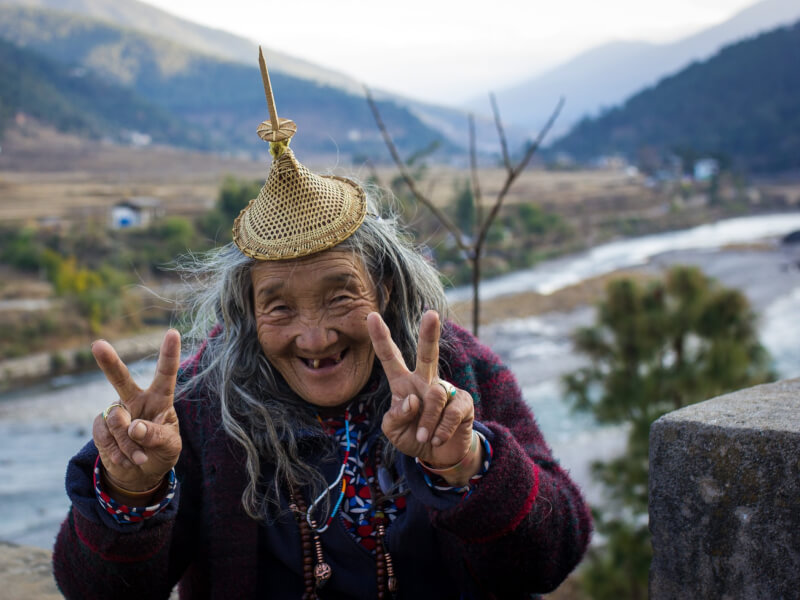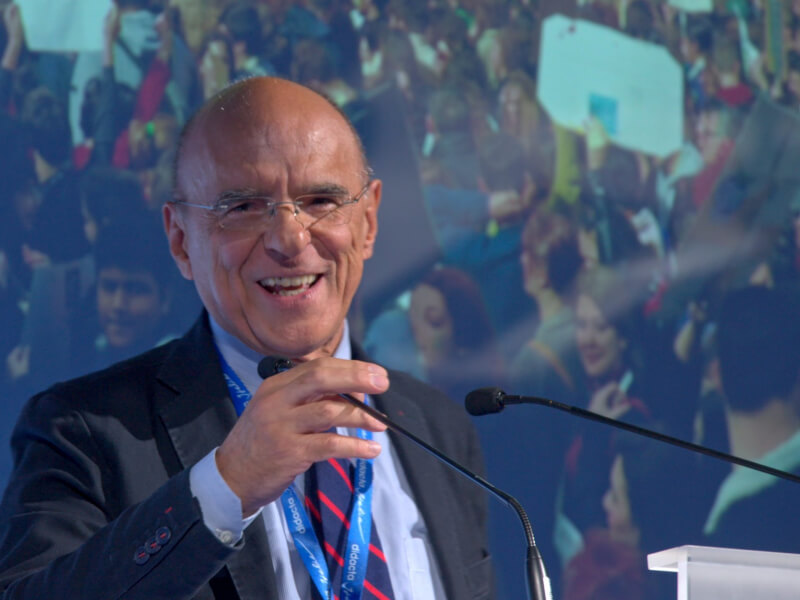06 November 2023 – As part of the Q&A series with the authors of Limits and Beyond, we sat down with Julia Kim, a member of The Club of Rome and International Advisor at the Gross National Happiness (GNH) Centre in Bhutan. Kim shares her insights about Bhutan’s commitment to prioritise the wellbeing and happiness of all life, and explains how the Gross National Happiness principles could be relevant to other countries, cities and organisations that seek to transition towards wellbeing economies.
What does Gross National Happiness mean?
Gross National Happiness (GNH) is a turn on the phrase Gross National Product (GNP) or Gross Domestic Product (GDP). It was coined by the fourth King of Bhutan who in response to a reporter’s question about the country’s GNP, said that in Bhutan, Gross National Happiness is more important than Gross National Product. As the country started to open up to the world in the early 1970s, this wise, young king wanted to ensure that it developed in a way that was not just about maximising economic growth, but also making sure that the happiness and wellbeing of all life was a priority. Since then, Bhutan has developed various measures such as national surveys and policymaking tools to bring some more substance and application to that visionary statement. The GNH survey measures factors relating to basic needs, such as adequate living standards, education and health, but also indicators like psychological wellbeing, community vitality, time use, cultural diversity and resilience, good governance and the environment – areas that have been shown to deteriorate if we only pursue GDP growth.
How does the GNH Centre aim to put the principles into practice?
The GNH Centre is a nonprofit, non-governmental organisation with the purpose of raising awareness and action around Gross National Happiness, both in Bhutan and abroad. Much of the Centre’s work focuses on providing experiential learning programs to help international people deepen their understanding of GNH and how it is put into practice. They can then hopefully reflect on their own contexts and be inspired to apply or adapt the principles in their own organisations or country. Bhutan is going through a period of rapid transition right now, including recovering from the social and economic impacts of the Covid-19 pandemic. So, another focus of the centre is applying GNH principles in this changing environment and finding ways to make sure that the values are relevant to a young generation in a globalised world.
How can other countries follow the example of Bhutan in creating wellbeing economies?
I think people in Bhutan would be quite humble about their accomplishments. As the first prime minister said, Bhutan has not necessarily “attained” GNH; this is about a journey rather than a destination. I think what sets Bhutan apart is that it has made happiness and wellbeing the priority and has developed tools and strategies to try to align the country in that direction. There are other countries that are trying to do the same, trying to ‘de-throne’ GDP and look at new measurements of progress. Because making big changes at a national level is often difficult, at a smaller scale, cities, organisations and businesses can take the lead in showing how the pursuit of profit and narrow metrics around finance are no longer acceptable today given the deep economic, social and climate crises we are facing. In addition, GNH is about balancing both the material and spiritual aspects of wellbeing. There is a focus on shifting our consciousness, changing our mindsets and paradigms. GNH encourages us to ask what the inner shift is that is required to move from a culture of greed, self-interest and competition, towards one of “enoughness,” interdependence and cooperation.
You talk about self-leadership in your chapter. How is this connected to the principles of GNH?
Going beyond GDP and shifting what we measure is certainly important – but by itself, will not be enough. I think the past ten years have been a big wake-up call for many people around the world, making us realise that we can’t just sit back and rely on formal leadership and governance structures to bring about the kind of deep transformation that’s required to get us out of the current polycrisis. What we also need is something the King of Bhutan has called “leadership of the self” – a deeper understanding of our values, and the capacities and the mindsets we bring into our lives and our work. As Donella Meadows, one of the authors of The Limits to Growth said, because mindsets and paradigms guide behaviour, changing them can be a really powerful leverage point for changing whole systems. In Bhutan, GNH has been deeply influenced by Mahayana Buddhism. Similarly, across many cultures, there is a common desire for health, wellbeing, connection, purpose, and a meaningful life, even if these have been eroded by our current economic system. So, reconnecting to these core values and cultivating our inner leadership capacities in the face of current challenges is an important part of transforming the larger systems we are a part of.
How is your work at The Club of Rome connected to these ideals?
The Club of Rome is uniquely positioned to look at innovative ways of addressing our current crises, both from an ‘outer,’ systems and an ‘inner,’ leadership perspective. We are focusing on issues such as going beyond GDP, changing finance, responding to the planetary emergency, emerging new civilisations and working intergenerationally with young people. All of these are opportunities to integrate inner leadership, shift policy frameworks and work on addressing the root causes of the current crises instead of just making small, cosmetic changes to the existing system.
Limits and Beyond is a collection of essays from world-renowned thinkers, scientists, and economists from across the globe, grappling with the most acute issues of our time. Published on the 50th anniversary of The Limits to Growth, it explores what we learnt and where we go from here.






